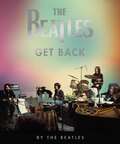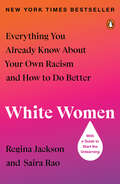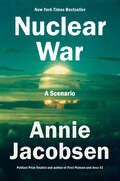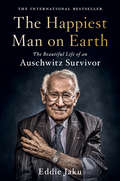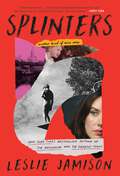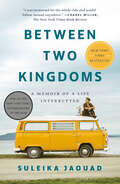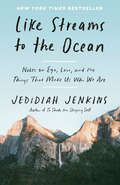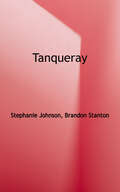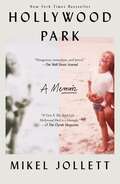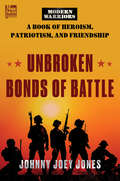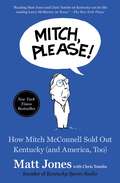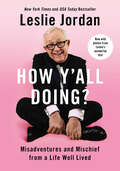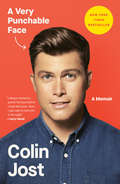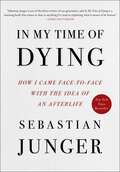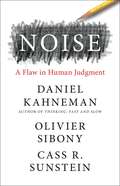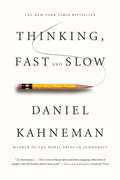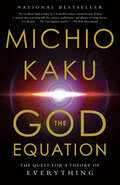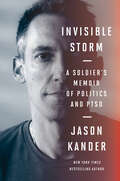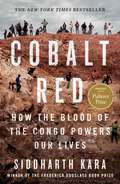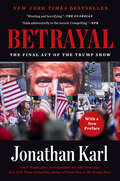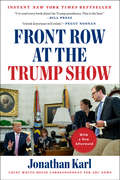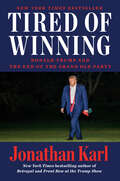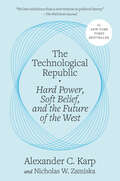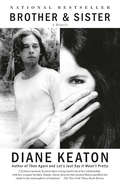Special Collections
New York Times Best Sellers - Non-Fiction
Description: Bookshare is pleased to offer the top 10 non-fiction books from the New York Times best seller list on a weekly basis. Books are added in as they become available. The month corresponds to the first time they appeared on the list. #adults
- Table View
- List View
The Beatles
by The Beatles and Peter Jackson and Hanif Kureishi and Ethan A. Russell and Linda McCartneyThe most anticipated book in more than a decade by the legendary band, The Beatles: Get Back is the official account of the creation of their final album, Let It Be, told in The Beatles’ own words, illustrated with hundreds of previously unpublished images, including photos by Ethan A. Russell and Linda McCartney. Half a century after the 1970 Let It Be album and film, this milestone book coincides with the global release of Peter Jackson’s documentary feature film, The Beatles: Get Back.
The book opens in January 1969, the beginning of The Beatles’ last year as a band. The BEATLES (The White Album) is at number one in the charts and the foursome gather in London for a new project. Over 21 days, first at Twickenham Film Studios and then at their own brand-new Apple Studios, with cameras and tape recorders documenting every day’s work and conversations, the band rehearse a huge number of songs, culminating in their final concert, which famously takes place on the rooftop of their own office building, bringing central London to a halt.
The Beatles: Get Back tells the story of those sessions through transcripts of the band’s candid conversations. Drawing on over 120 hours of sound recordings, leading music writer John Harris edits the richly captivating text to give us a fly-on-the-wall experience of being there in the studios. These sessions come vividly to life through hundreds of unpublished, extraordinary images by two photographers who had special access to their sessions—Ethan A. Russell and Linda Eastman (who married Paul McCartney two months later). Also included are many unseen high-resolution film-frames, selected from the 55 hours of restored footage from which Peter Jackson’s documentary is also drawn.
Legend has it that these sessions were a grim time for a band falling apart. However, as acclaimed novelist Hanif Kureishi writes in his introduction, “In fact this was a productive time for them, when they created some of their best work. And it is here that we have the privilege of witnessing their early drafts, the mistakes, the drift and digressions, the boredom, the excitement, joyous jamming and sudden breakthroughs that led to the work we now know and admire." Half a century after their final performance, this book completes the story of the creative genius, timeless music, and inspiring legacy of The Beatles.
White Women
by Regina Jackson and Saira RaoA no-holds-barred guidebook aimed at white women who want to stop being nice and start dismantling white supremacy.It's no secret that white women are conditioned to be "nice," but did you know that the desire to be perfect and to avoid conflict at all costs are characteristics of white supremacy culture? As the founders of Race2Dinner, an organization which facilitates conversations between white women about racism and white supremacy, Regina Jackson and Saira Rao have noticed white women's tendency to maintain a veneer of niceness, and strive for perfection, even at the expense of anti-racism work.In this book, Jackson and Rao pose these urgent questions: how has being "nice" helped Black women, Indigenous women and other women of color? How has being "nice" helped you in your quest to end sexism? Has being "nice" earned you economic parity with white men? Beginning with freeing white women from this oppressive need to be nice, they deconstruct and analyze nine aspects of traditional white woman behavior--from tone-policing to weaponizing tears--that uphold white supremacy society, and hurt all of us who are trying to live a freer, more equitable life.White Women is a call to action to those of you who are looking to take the next steps in dismantling white supremacy. Your white supremacy. If you are in fact doing real anti-racism work, you will find few reasons to be nice, as other white people want to limit your membership in the club. If you are not ticking white people off on a regular basis, you are not doing it right.
Nuclear War
by Annie JacobsenThe INSTANT New York Times bestseller Instant Los Angeles Times bestsellerOne of NPR's Books We LoveOne of Newsweek Staffers' Favorite Books of the YearShortlisted for the Baillie Gifford Prize&“In Nuclear War: A Scenario, Annie Jacobsen gives us a vivid picture of what could happen if our nuclear guardians fail…Terrifying.&”—Wall Street Journal There is only one scenario other than an asteroid strike that could end the world as we know it in a matter of hours: nuclear war. And one of the triggers for that war would be a nuclear missile inbound toward the United States. Every generation, a journalist has looked deep into the heart of the nuclear military establishment: the technologies, the safeguards, the plans, and the risks. These investigations are vital to how we understand the world we really live in—where one nuclear missile will beget one in return, and where the choreography of the world&’s end requires massive decisions made on seconds&’ notice with information that is only as good as the intelligence we have. Pulitzer Prize finalist Annie Jacobsen&’s Nuclear War: A Scenario explores this ticking-clock scenario, based on dozens of exclusive new interviews with military and civilian experts who have built the weapons, have been privy to the response plans, and have been responsible for those decisions should they have needed to be made. Nuclear War: A Scenario examines the handful of minutes after a nuclear missile launch. It is essential reading, and unlike any other book in its depth and urgency.
The Happiest Man on Earth
by Eddie JakuIn this uplifting memoir in the vein of The Last Lecture and Man’s Search for Meaning, a Holocaust survivor pays tribute to those who were lost by telling his story, sharing his wisdom, and living his best possible life.
Born in Leipzig, Germany, into a Jewish family, Eddie Jaku was a teenager when his world was turned upside-down. On November 9, 1938, during the terrifying violence of Kristallnacht, the Night of Broken Glass, Eddie was beaten by SS thugs, arrested, and sent to a concentration camp with thousands of other Jews across Germany. Every day of the next seven years of his life, Eddie faced unimaginable horrors in Buchenwald, Auschwitz, and finally on a forced death march during the Third Reich’s final days. The Nazis took everything from Eddie—his family, his friends, and his country. But they did not break his spirit.
Against unbelievable odds, Eddie found the will to survive. Overwhelming grateful, he made a promise: he would smile every day in thanks for the precious gift he was given and to honor the six million Jews murdered by Hitler. Today, at 100 years of age, despite all he suffered, Eddie calls himself the “happiest man on earth.” In his remarkable memoir, this born storyteller shares his wisdom and reflects on how he has led his best possible life, talking warmly and openly about the power of gratitude, tolerance, and kindness. Life can be beautiful if you make it beautiful. With The Happiest Man on Earth, Eddie shows us how.
Filled with his insights on friendship, family, health, ethics, love, and hatred, and the simple beliefs that have shaped him, The Happiest Man on Earth offers timeless lessons for readers of all ages, especially for young people today.
A New York Times Bestseller
Splinters
by Leslie JamisonFrom the New York Times bestselling author of The Recovering and The Empathy Exams comes &“a blazing, unputdownable memoir&” (Mary Karr, author of Lit), the &“piercing, intimate&” story (TIME Magazine) of rebuilding a life after the end of a marriage—an exploration of motherhood, art, and new love. Leslie Jamison has become one of our most beloved contemporary voices, a scribe of the real, the true, the complex. She has been compared to Joan Didion and Susan Sontag, acclaimed for her powerful thinking, deep feeling, and electric prose. But while Jamison has never shied away from challenging material—scouring her own psyche and digging into our most unanswerable questions across four books—Splinters enters a new realm. In her first memoir, Jamison turns her unrivaled powers of perception on some of the most intimate relationships of her life: her consuming love for her young daughter, a ruptured marriage once swollen with hope, and the shaping legacy of her own parents&’ complicated bond. In examining what it means for a woman to be many things at once—a mother, an artist, a teacher, a lover—Jamison places the magical and the mundane side by side in surprising ways. The result is a work of nonfiction like no other, an almost impossibly deep reckoning with the muchness of life and art, and a book that grieves the departure of one love even as it celebrates the arrival of another. How do we move forward into joy when we are haunted by loss? How do we claim hope alongside the harm we&’ve caused? A memoir for which the very term tour de force seems to have been coined, Splinters plumbs these and other pressing questions with writing that is revelatory to the last page, full of linguistic daring and emotional acuity. Jamison, a master of nonfiction, evinces once again her ability to &“stitch together the intellectual and the emotional with the finesse of a crackerjack surgeon&” (NPR).
Between Two Kingdoms
by Suleika JaouadIn the summer after graduating from college, Suleika Jaouad was preparing, as they say in commencement speeches, to enter “the real world.” She had fallen in love and moved to Paris to pursue her dream of becoming a war correspondent. The real world she found, however, would take her into a very different kind of conflict zone.
It started with an itch—first on her feet, then up her legs, like a thousand invisible mosquito bites. Next came the exhaustion, and the six-hour naps that only deepened her fatigue. Then a trip to the doctor and, a few weeks shy of her twenty-third birthday, a diagnosis: leukemia, with a 35 percent chance of survival.
Just like that, the life she had imagined for herself had gone up in flames. By the time Jaouad flew home to New York, she had lost her job, her apartment, and her independence. She would spend much of the next four years in a hospital bed, fighting for her life and chronicling the saga in a column for The New York Times.
When Jaouad finally walked out of the cancer ward—after countless rounds of chemo, a clinical trial, and a bone marrow transplant—she was, according to the doctors, cured. But as she would soon learn, a cure is not where the work of healing ends; it’s where it begins.
She had spent the past 1,500 days in desperate pursuit of one goal—to survive. And now that she’d done so, she realized that she had no idea how to live. How would she reenter the world and live again? How could she reclaim what had been lost?
Jaouad embarked—with her new best friend, Oscar, a scruffy terrier mutt—on a 100-day, 15,000-mile road trip across the country. She set out to meet some of the strangers who had written to her during her years in the hospital: a teenage girl in Florida also recovering from cancer; a teacher in California grieving the death of her son; a death-row inmate in Texas who’d spent his own years confined to a room. What she learned on this trip is that the divide between sick and well is porous, that the vast majority of us will travel back and forth between these realms throughout our lives.
Between Two Kingdoms is a profound chronicle of survivorship and a fierce, tender, and inspiring exploration of what it means to begin again.
New York Times Bestseller
Like Streams to the Ocean
by Jedidiah JenkinsYou can travel the world looking for yourself, but if you don't know what you're looking for, how can you find it? Like Streams To The Ocean is about examining the things that make us who we are and getting to know ourselves, our stories, and the decisions that shape our one and only life. Writing with the passion and clarity that made his debut, To Shake the Sleeping Self, a national bestseller, Jedidiah Jenkins brings together new and old writings to explore the eight subjects that give life meaning: ego, family, home, friendship, love, work, death, the soul.
Who am I? What am I made of? How much of how I act boils down to avoiding the things that make me feel small? As he examines the experiences that shape our conscious and subconscious answers to these questions, Jenkins leads readers in a wide-ranging conversation about finding fulfillment in the people and places around us and discovering the courage to show our deepest selves to the world.
A New York Times Bestseller
Tanqueray
by Stephanie Johnson and Brandon Stanton"A deeply touching memoir . . . A beautiful, sometimes shocking NC-17 story, kept out of the lily-white, upper crust canon of literature--until now."" --The Washington Post The storytelling phenomenon Humans of New York and its #1 bestselling books have captivated a global audience of millions with personal narratives that illuminate the human condition. But one story stands apart from the rest... She is a woman as fabulous, unbowed, and irresistible as the city she lives in. Meet TANQUERAY. In 2019, Humans of New York featured a photo of a woman in an outrageous fur coat and hat she made herself. She instantly captured the attention of millions. Her name is Stephanie Johnson, but she's better known to HONY followers as ""Tanqueray,"" a born performer who was once one of the best-known burlesque dancers in New York City. Reeling from a brutal childhood, immersed in a world of go-go dancers and hustlers, dirty cops and gangsters, Stephanie was determined to become the fiercest thing the city had ever seen. And she succeeded. Real, raw, and unapologetically honest, this is the full story of Tanqueray as told by Brandon Stanton--a book filled with never-before-told stories of Tanqueray's struggles and triumphs through good times and bad, personal photos from her own collection, and glimpses of New York City from back in the day when the name "Tanqueray" was on everyone's lips."
Hollywood Park
by Mikel JollettPARK is a remarkable memoir of a tumultuous life. Mikel Jollett was born into one of the country’s most infamous cults, and subjected to a childhood filled with poverty, addiction, and emotional abuse. Yet, ultimately, his is a story of fierce love and family loyalty told in a raw, poetic voice that signals the emergence of a uniquely gifted writer.
We were never young. We were just too afraid of ourselves. No one told us who we were or what we were or where all our parents went. They would arrive like ghosts, visiting us for a morning, an afternoon. They would sit with us or walk around the grounds, to laugh or cry or toss us in the air while we screamed. Then they’d disappear again, for weeks, for months, for years, leaving us alone with our memories and dreams, our questions and confusion. …
So begins Hollywood Park, Mikel Jollett’s remarkable memoir. His story opens in an experimental commune in California, which later morphed into the Church of Synanon, one of the country’s most infamous and dangerous cults. Per the leader’s mandate, all children, including Jollett and his older brother, were separated from their parents when they were six months old, and handed over to the cult’s “School.”
After spending years in what was essentially an orphanage, Mikel escaped the cult one morning with his mother and older brother. But in many ways, life outside Synanon was even harder and more erratic.In his raw, poetic and powerful voice, Jollett portrays a childhood filled with abject poverty, trauma, emotional abuse, delinquency and the lure of drugs and alcohol.
Raised by a clinically depressed mother, tormented by his angry older brother, subjected to the unpredictability of troubled step-fathers and longing for contact with his father, a former heroin addict and ex-con, Jollett slowly, often painfully, builds a life that leads him to Stanford University and, eventually, to finding his voice as a writer and musician.Hollywood Park is told at first through the limited perspective of a child, and then broadens as Jollett begins to understand the world around him. Although Mikel Jollett’s story is filled with heartbreak, it is ultimately an unforgettable portrayal of love at its fiercest and most loyal.
A New York Times Bestseller
Unbroken Bonds of Battle
by Johnny Joey JonesLife only really starts when we start serving others.
For many people, military service isn’t simply a job. It’s a ticket out of a lonely society and into a family of enduring bonds.
In over a decade of working with veterans, Johnny Joey Jones has discovered the power of battle-forged friendships. Suffering a life-changing injury while deployed in Afghanistan, he faced a daunting recovery. But coming home would have been much harder without the support of his brothers and sisters in arms.
In Unbroken Bonds of Battle, Joey tells the stories of those very warriors, who for years have supported and inspired him on the battlefield and off. Through unfiltered and authentic conversations with American heroes in every branch of service, Joey tackles the big questions about life, loss, and, of course, hunting.
Powerful life lessons are woven throughout these personal oral histories. Also included is a scrapbook of beautiful candid photographs from the lives of these modern warriors.
A gorgeous patriotic keepsake, Unbroken Bonds of Battle reminds us of the costs paid by those who defend our freedom through unvarnished, inspiring tales of friendship.
New York Times Bestseller
Mitch, Please!
by Matt JonesThe New York Times and Wall Street Journal bestseller about how Mitch McConnell has been bad for Kentucky—and why he needs to be voted out of office from the founder of Kentucky Sports Radio and attorney Matt Jones.They say all politics is local. In 2020, Mitch McConnell will have served five full terms as a US Senator. Thirty years. The Senate Majority leader&’s power is as undeniable as it is infuriating, and the people of Kentucky have had enough. Led by Matt Jones, they (and they alone) have the power to oust him from office. How did Jones, a local boy turned attorney turned sports radio host come to shine the brightest light on McConnell&’s ineptitude? Simple—he knows Kentucky inside and out, and has used the state&’s love of sports as an entry point for showcasing how McConnell has failed his fellow citizens both economically and socially for three decades. Entertaining, maddening, yet ultimately inspiring, these stories from Kentuckians in each of its 120 counties illustrate the Senate Majority leader&’s stunning shortcomings. &“Jones employs a sharp, political scalpel eviscerating McConnell…[and this book is] an effective combination of description and vivisection&” (Kirkus Reviews). Jones brings his trademark wit and wisdom throughout the book, while also offering a beautiful portrait of a state with arguably the most untapped potential in our country. Ultimately, the white-hot hatred for McConnell on the coasts is just white noise. Only the people of Kentucky can remove him from office. Here, Matt Jones demonstrates he has the influence, charisma, and institutional knowledge to lead the charge. He and his fellow Kentuckians have had enough—and they&’re ready for a fight.
How Y'all Doing?
by Leslie JordanViral sensation and Emmy Award-winner Leslie Jordan regales fans with entertaining stories about the odd, funny, and unforgettable events in his life in this unmissable essay collection that echoes his droll, irreverent voice.
When actor Leslie Jordan learned he had “gone viral,” he had no idea what that meant or how much his life was about to change. On Instagram, his uproarious videos have entertained millions and have made him a global celebrity. Now, he brings his bon vivance to the page with this collection of intimate and sassy essays.
Bursting with color and life, dripping with his puckish Southern charm, How Y’all Doing? is Leslie doing what Leslie does best: telling stories that make us laugh and lift our spirits even in the darkest days. Whether he’s writing about his brush with a group of ruffians in a West Hollywood Starbucks, or an unexpected phone call from legendary Hollywood start Debbie Reynolds, Leslie infuses each story with his fresh and saucy humor and pure heart.
How Y’all Doing? is an authentic, warm, and joyful portrait of an American Sweetheart— a Southern Baptist celebutante, first-rate raconteur, and keen observer of the odd side of life whose quirky wit rivals the likes of Amy Sedaris, Jenny Lawson, David Rakoff, and Sarah Vowell.
A New York Times Best Seller
The Art of Her Deal
by Mary JordanIn this &“scrupulously reported biography&” (NPR) Jordan documents how Melania Trump had discussing being First Lady nearly two decades before she landed in the White House and how she encouraged her husband to enter the race for president.Based on interviews with more than one hundred people in five countries, The Art of Her Deal: The Untold Story of Melania Trump is &“an extraordinary work&” (Salon) that draws an unprecedented portrait of the first lady. We see that behind the scenes Melania Trump is not only part of President Trump&’s inner circle, but for some key decisions she has been his single most influential advisor. Jordan interviewed key people in Melania's close circle who speak publicly for the first time and uncovered never-before-seen photos and tapes of the tall woman with &“tiger eyes,&” as a judge in an early modeling contest said. The Art of Her Deal shows Melania&’s ascent from a modest life, tracing her journey from childhood under a communist dictator to her complicated relationship with Donald Trump. The picture that emerges is &“that the first lady is not a pawn but a player... and a woman able to get what she wants from one of the most powerful and transparently vain men in the world&” (NPR). And while it is her husband who became famous for the phrase &“the art of the deal,&” this is the story of the art of her deal.
A Very Punchable Face
by Colin JostIf there’s one trait that makes someone well suited to comedy, it’s being able to take a punch—metaphorically and, occasionally, physically.
From growing up in a family of firefighters on Staten Island to commuting three hours a day to high school and “seeing the sights” (like watching a Russian woman throw a stroller off the back of a ferry), to attending Harvard while Facebook was created, Jost shares how he has navigated the world like a slightly smarter Forrest Gump.
You’ll also discover things about Jost that will surprise and confuse you, like how Jimmy Buffett saved his life, how Czech teenagers attacked him with potato salad, how an insect laid eggs inside his legs, and how he competed in a twenty-five-man match at WrestleMania (and almost won). You'll go behind the scenes at SNL and Weekend Update (where he's written some of the most memorable sketches and jokes of the past fifteen years). And you’ll experience the life of a touring stand-up comedian—from performing in rural college cafeterias at noon to opening for Dave Chappelle at Radio City Music Hall.
For every accomplishment (hosting the Emmys), there is a setback (hosting the Emmys). And for every absurd moment (watching paramedics give CPR to a raccoon), there is an honest, emotional one (recounting his mother’s experience on the scene of the Twin Towers’ collapse on 9/11). Told with a healthy dose of self-deprecation, A Very Punchable Face reveals the brilliant mind behind some of the dumbest sketches on television, and lays bare the heart and humor of a hardworking guy—with a face you can’t help but want to punch.
A New York Times Bestseller
In My Time of Dying
by Sebastian JungerA near-fatal health emergency leads to this powerful reflection on death—and what might follow—by the bestselling author of Tribe and The Perfect Storm.For years as an award-winning war reporter, Sebastian Junger traveled to many front lines and frequently put his life at risk. And yet the closest he ever came to death was the summer of 2020 while spending a quiet afternoon at the New England home he shared with his wife and two young children. Crippled by abdominal pain, Junger was rushed to the hospital by ambulance. Once there, he began slipping away. As blackness encroached, he was visited by his dead father, inviting Junger to join him. &“It&’s okay,&” his father said. &“There&’s nothing to be scared of. I&’ll take care of you.&” That was the last thing Junger remembered until he came to the next day when he was told he had suffered a ruptured aneurysm that he should not have survived. This experience spurred Junger—a confirmed atheist raised by his physicist father to respect the empirical—to undertake a scientific, philosophical, and deeply personal examination of mortality and what happens after we die. How do we begin to process the brutal fact that any of us might perish unexpectedly on what begins as an ordinary day? How do we grapple with phenomena that science may be unable to explain? And what happens to a person, emotionally and spiritually, when forced to reckon with such existential questions? In My Time of Dying is part medical drama, part searing autobiography, and part rational inquiry into the ultimate unknowable mystery.
Noise
by Cass R. Sunstein and Daniel Kahneman and Olivier SibonyFrom the Nobel Prize-winning author of Thinking, Fast and Slow and the coauthor of Nudge, a revolutionary exploration of why people make bad judgments and how to make better ones--"full of novel insights, rigorous evidence, engaging writing, and practical applications” (Adam Grant). Imagine that two doctors in the same city give different diagnoses to identical patients—or that two judges in the same courthouse give markedly different sentences to people who have committed the same crime. Suppose that different interviewers at the same firm make different decisions about indistinguishable job applicants—or that when a company is handling customer complaints, the resolution depends on who happens to answer the phone. Now imagine that the same doctor, the same judge, the same interviewer, or the same customer service agent makes different decisions depending on whether it is morning or afternoon, or Monday rather than Wednesday. These are examples of noise: variability in judgments that should be identical. In Noise, Daniel Kahneman, Olivier Sibony, and Cass R. Sunstein show the detrimental effects of noise in many fields, including medicine, law, economic forecasting, forensic science, bail, child protection, strategy, performance reviews, and personnel selection. Wherever there is judgment, there is noise. Yet, most of the time, individuals and organizations alike are unaware of it. They neglect noise. With a few simple remedies, people can reduce both noise and bias, and so make far better decisions. Packed with original ideas, and offering the same kinds of research-based insights that made Thinking, Fast and Slow and Nudge groundbreaking New York Times bestsellers, Noise explains how and why humans are so susceptible to noise in judgment—and what we can do about it.
Thinking, Fast And Slow
by Daniel KahnemanFirst is fast, intuitive, and emotional; Second is slower, more deliberative, and more logical. The impact of overconfidence on corporate strategies, the difficulties of predicting what will make us happy in the future, the profound effect of cognitive biases on everything from playing the stock market to planning our next vacation--each of these can be understood only by knowing how the two systems shape our judgements and decisions.
New York Times Bestseller
The God Equation
by Michio Kaku#1 NEW YORK TIMES BESTSELLER • The epic story of the greatest quest in all of science—the holy grail of physics that would explain the creation of the universe—from renowned theoretical physicist and author of The Future of the Mind and The Future of Humanity.When Newton discovered the law of gravity, he unified the rules governing the heavens and the Earth. Since then, physicists have been placing new forces into ever-grander theories. But perhaps the ultimate challenge is achieving a monumental synthesis of the two remaining theories—relativity and the quantum theory. This would be the crowning achievement of science, a profound merging of all the forces of nature into one beautiful, magnificent equation to unlock the deepest mysteries in science: What happened before the Big Bang? What lies on the other side of a black hole? Are there other universes and dimensions? Is time travel possible? Why are we here? Kaku also explains the intense controversy swirling around this theory, with Nobel laureates taking opposite sides on this vital question. It is a captivating, gripping story; what&’s at stake is nothing less than our conception of the universe. Written with Kaku&’s trademark enthusiasm and clarity, this epic and engaging journey is the story of The God Equation.
Invisible Storm
by Jason KanderFrom political wunderkind and former army intelligence officer Jason Kander comes a haunting, powerful memoir about impossible choices—and how sometimes walking away from the chance of a lifetime can be the greatest decision of all.
In 2017, President Obama, in his final Oval Office interview, was asked who gave him hope for the future of the country, and Jason Kander was the first name he mentioned. Suddenly, Jason was a national figure. As observers assumed he was preparing a run for the presidency, Jason announced a bid for mayor of Kansas City instead and was headed for a landslide victory. But after eleven years battling PTSD from his service in Afghanistan, Jason was seized by depression and suicidal thoughts. He dropped out of the mayor’s race and out of public life. And finally, he sought help.
In this brutally honest second memoir, following his New York Times best-selling debut Outside the Wire, Jason Kander has written the book he himself needed in the most painful moments of his PTSD. In candid, in-the-moment detail, we see him struggle with undiagnosed illness during a presidential bid; witness his family buoy him through challenging treatment; and, giving hope to so many of us, see him heal.
New York Times Bestseller
Cobalt Red
by Siddharth KaraThe revelatory Pulitzer Prize finalist for General Nonfiction, New York Times and Publishers Weekly bestseller, shortlisted for the Financial Times Best Business Book of the Year Award.An unflinching investigation reveals the human rights abuses behind the Congo’s cobalt mining operation—and the moral implications that affect us all.Cobalt Red is the searing, first-ever exposé of the immense toll taken on the people and environment of the Democratic Republic of the Congo by cobalt mining, as told through the testimonies of the Congolese people themselves. Activist and researcher Siddharth Kara has traveled deep into cobalt territory to document the testimonies of the people living, working, and dying for cobalt. To uncover the truth about brutal mining practices, Kara investigated militia-controlled mining areas, traced the supply chain of child-mined cobalt from toxic pit to consumer-facing tech giants, and gathered shocking testimonies of people who endure immense suffering and even die mining cobalt.Cobalt is an essential component to every lithium-ion rechargeable battery made today, the batteries that power our smartphones, tablets, laptops, and electric vehicles. Roughly 75 percent of the world’s supply of cobalt is mined in the Congo, often by peasants and children in sub-human conditions. Billions of people in the world cannot conduct their daily lives without participating in a human rights and environmental catastrophe in the Congo. In this stark and crucial book, Kara argues that we must all care about what is happening in the Congo—because we are all implicated.
Betrayal
by Jonathan KarlPicking up where the New York Times bestselling Front Row at the Trump Show left off, this is the explosive look at the aftermath of the election—and the events that followed Donald Trump’s leaving the White House—from ABC News' chief Washington correspondent.
Nobody is in a better position to tell the story of the shocking final chapter of the Trump show than Jonathan Karl. As the reporter who has known Donald Trump longer than any other White House correspondent, Karl told the story of Trump’s rise in the New York Times bestseller Front Row at the Trump Show. Now he tells the story of Trump’s downfall, complete with riveting behind-the-scenes accounts of some of the darkest days in the history of the American presidency and packed with original reporting and on-the-record interviews with central figures in this drama who are telling their stories for the first time.
This is a definitive account of what was really going on during the final weeks and months of the Trump presidency and what it means for the future of the Republican Party, by a reporter who was there for it all. He has been taunted, praised, and vilified by Donald Trump, and now Jonathan Karl finds himself in a singular position to deliver the truth.
Front Row at the Trump Show
by Jonathan KarlAn account like no other from the White House reporter who has known President Trump for more than 25 years. We have never seen a president like this...norm-breaking, rule-busting, dangerously reckless to some and an overdue force for change to others. One thing is clear: We are witnessing the reshaping of the presidency.
Jonathan Karl brings us into the White House in a powerful book unlike any other on the Trump administration. He&’s known and covered Donald Trump longer than any other White House reporter. With extraordinary access to Trump during the campaign and at 1600 Pennsylvania Avenue, Karl delivers essential new reporting and surprising insights.
These are the behind-the-scenes moments that define Trump&’s presidency--an extraordinary look at the president, the person, and those closest to him. This is the real story of Trump’s unlikely rise; of the struggles and battles of those who work in the administration and those who report on it; of the plots and schemes of a senior staff enduring stunning and unprecedented unpredictability.
Karl takes us from a TV set turned campaign office to the strange quiet of Trump’s White House on Inauguration Day to a high-powered reelection campaign set to change the country’s course. He shows us an administration rewriting the role of the president on the fly and a press corps that has never been more vital. Above all, this book is only possible because of the surprisingly open relationship Donald Trump has had with Jonathan Karl, a reporter he has praised, fought, and branded an enemy of the people. This is Front Row at the Trump Show.
A New York Times Bestseller
Tired of Winning
by Jonathan KarlTHE INSTANT NEW YORK TIMES BESTSELLER "The most important thing that has been written to date about what is in front of the American people in the next presidential election." —Nicolle Wallace An extraordinary view into the politics of our times, Tired of Winning explores how Donald Trump remade the Republican Party in his own image—and the wreckage he&’s left in his wake. Packed with new reporting, Tired of Winning: Donald Trump and the End of the Grand Old Party tracks Trump&’s improbable journey from disgraced and defeated former president to the dominant force, yet again, in the Republican Party. From his exile in Mar-a-Lago, Donald Trump has become more extreme, vengeful, and divorced from reality than he was on January 6, 2021. His meddling damaged the GOP&’s electoral prospects for third consecutive election in 2022. His legal troubles are mounting. Yet he re-emerged as the frontrunner for the 2024 Republican presidential nomination. Jonathan Karl has known Donald Trump since his days as a New York Post reporter in the 1990s, and he covered every day of Trump&’s administration as ABC News&’s chief White House correspondent. No one is in a better position to detail the former president&’s quest for retribution and provide a glimpse at what the GOP would be signing up for if it once again chooses him as its standard bearer. In 1964, Ronald Reagan told Americans it was &“a time for choosing.&” Sixty years later, Republicans have their own choice to make: Are they tired of winning?
The Technological Republic
by Alexander C. Karp and Nicholas W. ZamiskaFrom the Palantir co-founder, one of tech’s boldest thinkers and The Economist’s “best CEO of 2024,” and his deputy, a sweeping indictment of the West’s culture of complacency, arguing that timid leadership, intellectual fragility, and an unambitious view of technology’s potential in Silicon Valley have made the U.S. vulnerable in an era of mounting global threats.
“Fascinating and important.”—Walter Isaacson, #1 New York Times bestselling author of Elon Musk
ONE OF FINANCIAL TIMES’ MOST ANTICIPATED BOOKS OF THE YEAR
Silicon Valley has lost its way. Our most brilliant engineering minds once collaborated with government to advance world-changing technologies. Their efforts secured the West’s dominant place in the geopolitical order. But that relationship has now eroded, with perilous repercussions. Today, the market rewards shallow engagement with the potential of technology. Engineers and founders build photo-sharing apps and marketing algorithms, unwittingly becoming vessels for the ambitions of others. This complacency has spread into academia, politics, and the boardroom. The result? An entire generation for whom the narrow-minded pursuit of the demands of a late capitalist economy has become their calling.
In this groundbreaking treatise, Palantir co-founder and CEO Alexander C. Karp and Nicholas W. Zamiska offer a searing critique of our collective abandonment of ambition, arguing that in order for the U.S. and its allies to retain their global edge—and preserve the freedoms we take for granted—the software industry must renew its commitment to addressing our most urgent challenges, including the new arms race of artificial intelligence. The government, in turn, must embrace the most effective features of the engineering mindset that has propelled Silicon Valley’s success. Above all, our leaders must reject intellectual fragility and preserve space for ideological confrontation. A willingness to risk the disapproval of the crowd, Karp and Zamiska contend, has everything to do with technological and economic outperformance. At once iconoclastic and rigorous, this book will also lift the veil on Palantir and its broader political project from the inside, offering a passionate call for the West to wake up to our new reality. New York Times Bestseller
Brother & Sister
by Diane KeatonFrom the beloved film star and best-selling author of Then Again--a heartfelt memoir about Diane Keaton's relationship with her younger brother, and a poignant exploration of the divergent paths siblings' lives can take.
When they were children in the suburbs of Los Angeles in the 1950s, Diane Keaton and her younger brother, Randy, were best friends and companions: they shared stories at night in their bunk beds; they swam, laughed, dressed up for Halloween. Their mother captured their American-dream childhoods in her diaries, and on camera. But as they grew up, Randy became troubled, then reclusive. By the time he reached adulthood, he was divorced, an alcoholic, a man who couldn't hold on to full-time work--his life a world away from his sister's, and from the rest of their family.
Now Diane is delving into the nuances of their shared, and separate, pasts to confront the difficult question of why and how Randy ended up living his life on "the other side of normal." In beautiful and fearless prose that's intertwined with photographs, journal entries, letters, and poetry--many of them Randy's own writing and art--this insightful memoir contemplates the inner workings of a family, the ties that hold it together, and the special bond between siblings even when they are pulled far apart. Here is a story about love and responsibility: about how, when we choose to reach out to the people we feel closest to--in moments of difficulty and loss--surprising things can happen. A story with universal echoes, Brother & Sister speaks across generations to families whose lives have been touched by the fragility and "otherness" of loved ones--and to brothers and sisters everywhere.
A New York Times Bestseller
